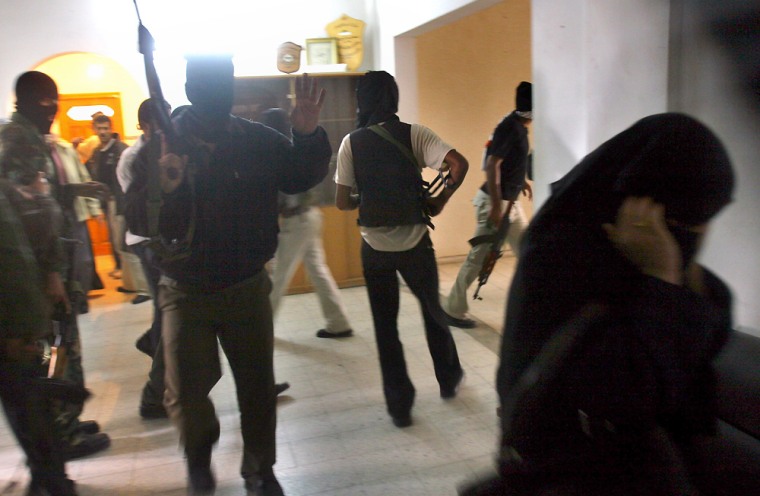Amid growing unrest among cash-strapped Palestinians, Russia said it has pledged urgent financial assistance to the Hamas-led Palestinian government despite an international boycott.
The Russian Foreign Ministry did not say how much money it offered.
Palestinian President Mahmoud Abbas “expressed great appreciation” for the pledge, which was conveyed by Foreign Minister Sergey Lavrov, the ministry said in a statement late Friday.
The European Union this week froze hundreds of millions of dollars in annual direct aid to the Palestinian government. The United States and Canada have also halted government aid, and the U.S. this week barred Americans from most dealings with the Palestinian government.
Growing unrest
The funding cutoff already is having an effect. Dozens of masked Palestinian police officers blocked a main road in the Gaza Strip on Saturday and briefly seized a government building to protest a delay in paying their salaries.
“Salaries, or go home,” the protesters chanted in the central town of Khan Younis, directing their message at Hamas in the biggest such demonstration since the Islamic militant group assumed power last month following its January election victory.
The security men, some of them firing in the air, burst into a government building in the town, briefly occupying offices and forcing workers to leave. They also blocked roads leading south to Rafah, on the border with Egypt.
Salaries for the 140,000 employees on the Palestinian Authority’s payroll are two weeks overdue. Many of the protesters in Khan Younis belonged to President Mahmoud Abbas' Fatah faction, Hamas' political rival.
West calls for boycott
The United States and the European Union have cut direct aid to the Hamas-led government because it has not met their demands to renounce violence, recognize Israel and agree to abide by interim peace deals.
The U.S. Treasury Department has also barred Americans, U.S. companies and the U.S. subsidiaries of foreign firms from pursuing most business dealings with the Palestinian Authority.
Russia broke the international isolation of Hamas last month by hosting a high-level delegation in a move seen as a bid by Russian President Vladimir Putin to raise Russia’s role in the Middle East peace process.
The decision provoked anger in Israel and surprise among the other members of the so-called Quartet of Middle East peacemakers. It made no apparent headway in persuading Hamas to soften its stance.
No money
“The economy is paralyzed. We can’t buy groceries because no one will give us credit. Taxi drivers, won’t give us a ride, because we don’t have money,” said Abu Mohammed, a leader of the protesters, most of them from the rival Fatah movement.
“We warn this is only a first step,” he said.
Palestinian Finance Minister Omar Abdel-Razek of Hamas said on al-Jazeera satellite television that he was “appalled and astonished” by the Khan Younis protest.
“Everyone knows (the cash crunch) is the result of the oppressive isolation that is forced on the Palestinian people and the government. They all know that the account is empty ... and we don’t have enough to pay salaries,” he said.
Hamas says it inherited a Palestinian Authority with empty coffers and more than $1.3 billion in government debts. The movement won election on a platform of cleaning up government corruption and pursuing armed struggle against Israel.
Accusing the United States of waging “economic war” against the Palestinian government, Abdel-Razek said Hamas would not be forced into political concessions and he voiced the hope that Arab governments would send financial aid soon.
Arabs countries press land-for-peace plan
Russia’s foreign minister on Tuesday criticized the West’s “boycott” of the Palestinian government, saying engagement was the only way to push the new Hamas leadership to meet international demands to recognize Israel, give up violence and acknowledge existing Israeli-Palestinian agreements.
In Cairo, Egypt, on Saturday, Arab officials urged the Palestinian foreign minister to consider an Arab plan to end the conflict with Israel that calls for exchanging land for peace.
Foreign Minister Mahmoud Zahar said he would discuss the initiative with the others in the government but pointed out that Israel had not yet accepted the deal.
“The problem is: does the other party accept it?” Zahar told reporters after a meeting with Arab League Secretary-General Amr Moussa and other Arab envoys.
Zahar arrived here Friday on the first leg of a regional tour that will take him later to Saudi Arabia and several Gulf nations to ask for support.
Arab countries have pledged to help close Hamas’ funding gap, but so far have not kept their promises.
